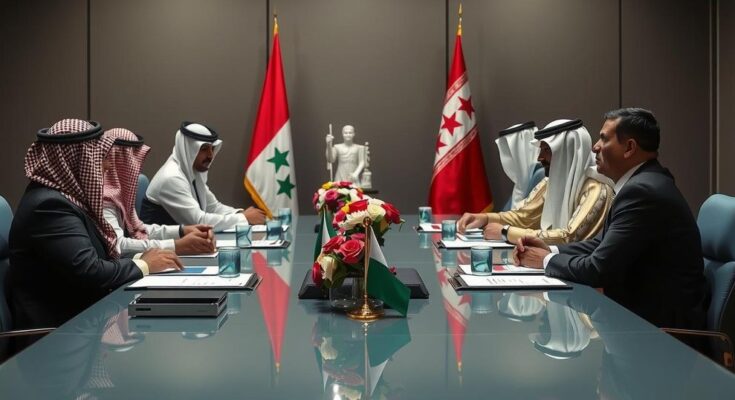Arab states, led by Qatar, are initiating dialogues with all factions in Syria to prevent a renewal of civil war. Qatar’s foreign ministry highlights the importance of inclusivity and urges collaboration among military forces, while recognizing the impact of regional players like Turkey and Israel on the ongoing situation.
In a bid to avert a resurgence of conflict in Syria, Arab states, led by Qatar, are initiating an open dialogue with all factions on the ground to ensure an inclusive transition reflecting the diversity of the Syrian populace. Majed al-Ansari, spokesperson for Qatar’s foreign ministry, expressed gratitude for the minimal fighting that led to the fall of President Bashar al-Assad’s regime, as it facilitates international engagement before hostilities escalate.
Al-Ansari emphasized the importance of maintaining state institutions and urged that no group should feel excluded from Syria’s future. He acknowledged the uncertainty regarding the military landscape, noting the need for cooperation among military factions to prevent internal conflict. Furthermore, he pointed out the potential for the current crisis to echo the failed revolutions of the Arab Spring, emphasizing the need for a stable, viable state that honors the sacrifices of the Syrian people.
He also recognized Turkey’s influence given its extensive ties with Syrian rebels and its role in managing refugee flows. Al-Ansari urged Israel to avoid actions that could escalate tensions before a national dialogue commences. While he did not indicate whether the Islamist group Hayat Tahrir al-Sham (HTS) should be removed from the UN terrorist list, he expressed cautious optimism regarding their conduct thus far, suggesting they could play a constructive role in future governance. The resolution of accountability issues, including the fate of Assad and the presence of Russian military bases, ultimately rests with the Syrian people. Furthermore, Al-Ansari noted with uncertainty, “He is in the wind. He is no longer in the city,” regarding Assad’s current status.
The civil war in Syria, which began in 2011, has resulted in widespread devastation and the displacement of millions. Following the recent upheaval within the Assad regime, various regional players seek to stabilize the situation to prevent renewed conflict. Qatar, having refused to recognize Assad’s legitimacy, is advocating for an inclusive dialogue among all Syrian factions, reflecting a broader Arab initiative to address the multifaceted challenges in Syria. The involvement of foreign powers adds complexity to the situation, as regional dynamics integrate with local disputes.
To summarize, Arab states, particularly Qatar, are prioritizing dialogue among Syrian factions to facilitate a peaceful transition and avoid the rekindling of violence. The emphasis is placed on inclusivity and the preservation of state institutions while navigating the uncertain military landscape. While recognizing the challenging circumstances, there is cautious optimism about the potential roles of various groups moving forward, underscoring a commitment to the future of Syria free from oppressive governance.
Original Source: www.theguardian.com




